初一英语下册知识点归纳总结
人教版七年级英语下册各知识点归纳总结
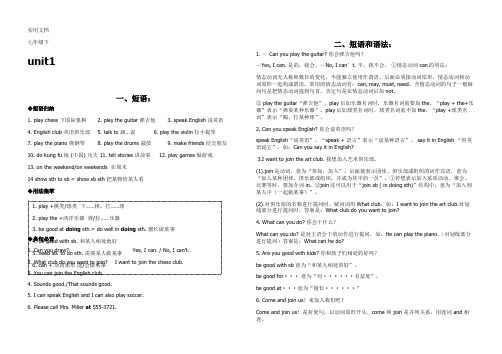
七年级下unit1一、短语:◆短语归纳1. play chess 下国际象棋2. play the guitar 弹吉他3. speak English 说英语4. English club 英语俱乐部5. talk to 跟…说6. play the violin 拉小提琴7. play the piano 弹钢琴8. play the drums 敲鼓9. make friends 结交朋友10. do kung fu 练 (中国) 功夫 11. tell stories 讲故事 12. play games 做游戏13. on the weekend/on weekends 在周末14 show sth to sb = show sb sth 把某物给某人看◆用法集萃◆典句必背1. Can you draw? Yes, I can. / No, I can’t.2. What club do you want to join? I want to join the chess club.3. You can join the English club.4. Sounds good./That sounds good.5. I can speak English and I can also play soccer.6. Please call Mrs. Miller at 555-3721.二、短语和语法:1. — Can you play the guitar? 你会弹吉他吗?—Yes, I can. 是的,我会。
—No, I can’t. 不,我不会。
①情态动词can的用法:情态动词无人称和数目的变化,不能独立使用作谓语,后面必须接动词原形,情态动词和动词原形一起构成谓语。
常用的情态动词有:can, may, must, need。
含情态动词的句子一般疑问句是把情态动词提到句首,否定句是在情态动词后加not。
七年级下册英语必背知识点
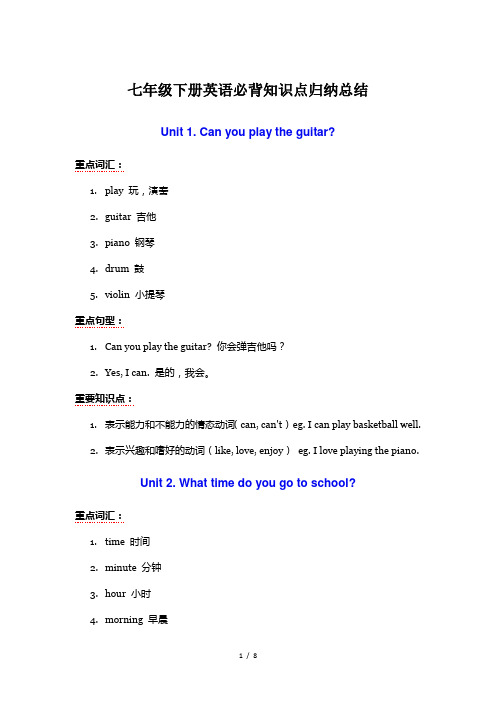
七年级下册英语必背知识点归纳总结Unit 1. Can you play the guitar?重点词汇:1.play 玩,演奏2.guitar 吉他3.piano 钢琴4.drum 鼓5.violin 小提琴重点句型:1.Can you play the guitar? 你会弹吉他吗?2.Yes, I can. 是的,我会。
重要知识点:1.表示能力和不能力的情态动词(can, can't)eg. I can play basketball well.2.表示兴趣和嗜好的动词(like, love, enjoy)eg. I love playing the piano.Unit 2. What time do you go to school?重点词汇:1.time 时间2.minute 分钟3.hour 小时4.morning 早晨5.afternoon 下午6.evening 晚上重点句型:1.What time do you get up? 你几点起床?2.I usually go to school at 7:30. 我通常七点半去上学。
重要知识点:1.表示时间的问答方式和用法eg. What time is it now? It's half past eight.2.表示日常生活习惯的一般现在时eg. I usually do my homework afterschool.Unit 3. How do you get to school?重点词汇:1.bike 自行车2.walk 步行3.bus 公交车4.subway 地铁5.taxi 出租车重点句型:1.How do you get to school? 你怎么去上学?2.I usually take the bus. 我通常坐公交车。
重要知识点:1.表示交通工具的名词和用法eg. I ride a bike to school every day.2.表示方式的副词和表达方式eg. He walks to work every morning.Unit 4. Don’t eat in class.重点词汇:1.don't do sth. 不要做某事2.eat 吃3.drink 喝4.talk 谈话5.listen 听6.music 音乐重点句型:1.Don't talk in class. 上课时不要讲话。
初一下学期英语重点知识点归纳总结学习资料

迟到
用法集萃
具体时间点 在几点(几分)
吃早饭/午饭/晚饭
基数词 ……点半
基数词 差一刻到……点
名词 从事……活动
从……到……
需要做某事
典句必背
I usually get up at six thirty.
1)用长度单位表示:It is five kilometers.
2)用时间表示:It’s twenty minutes’ walk.
用来提问时间,意为多久回答常用“for+段时”。
soon 用来提问做完某事还需要多长时间, 常用于将来时态时, 常用“in+时间段”
表示交通工具的名词,乘……去某地,是动词短语,在句中作谓语。
主语省略(无主语):Don’t arrive late for class.
:We can’t arrive ;ate for class.
在学校我们必须穿校服:We have to wear uniforms at school.
/必须做某事:have to do sth
don’t have to do sth
活动,比赛
说某种语言:speak+语言
、play+球、棋、牌;play+the+乐器。
、擅长于(做)什么:be good at +名词/动ing
、帮助某人做某事:help sb. (to ) do sth. help sb. with sth.
、我能知道你名字吗?May I know your name?
七年级下英语知识点大全

七年级下英语知识点大全七年级下英语是中学英语学习的基础阶段,对学生掌握英语基本语法、词汇、语音、语调等方面起到关键作用。
本文将从以下几个方面为大家梳理七年级下英语的知识点大全。
一、语法1. 一般现在时和一般过去时的构成和用法;2. 肯定形式、否定形式、疑问形式和回答形式的句型构成;3. 简单句和复合句的区别和构成;4. 祈使句、感叹句、陈述句以及疑问句的用法和句型构成;5. 含有情态动词的句子的构成和用法。
二、词汇1. 基本词汇:数字、颜色、天气、家庭、职业、饮食、交通、娱乐、身体各部位、时间等;2. 动词的一般现在时和一般过去时的时态变化和用法;3. 常用介词、副词、形容词、代词、连词等的用法;4. 重点词汇:名词、动词、形容词、副词等的辨析;5. 常用短语和惯用语的用法和意义。
三、语音1. 英语元音、辅音的发音方法及发音区别;2. 重音、轻音的区别及在不同单词中的应用;3. 连读、缩读、语调等基本语音技巧的运用。
四、阅读1. 了解文章结构和主旨;2. 阅读理解的基本方法和技巧;3. 文章中的重点句型和重点词汇;4. 不同类型文章的写作风格和特点。
五、写作1. 熟悉英语的基本句型;2. 如何遣词造句地表达自己的观点;3. 写作技巧和写作准则;4. 书信格式、邮件格式、短文格式等不同类型写作的特点和要求。
六、听说1. 听力技巧和训练方法;2. 默写、听音辨词、听音辨意训练;3. 听力材料的种类和来源;4. 口语练习、语音训练等讲练结合的技巧。
以上就是七年级下英语知识点大全,每个知识点都是相互关联的,只有融会贯通,才能在英语学习中更快地进步。
在学习过程中,一定要注重日积月累,努力掌握基础知识,打牢英语学习的基础。
七年级下册英语语法知识点归纳总结
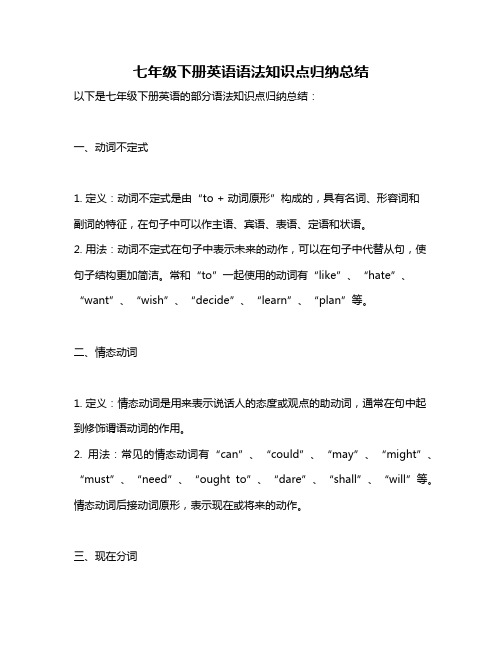
七年级下册英语语法知识点归纳总结以下是七年级下册英语的部分语法知识点归纳总结:一、动词不定式1. 定义:动词不定式是由“to + 动词原形”构成的,具有名词、形容词和副词的特征,在句子中可以作主语、宾语、表语、定语和状语。
2. 用法:动词不定式在句子中表示未来的动作,可以在句子中代替从句,使句子结构更加简洁。
常和“to”一起使用的动词有“like”、“hate”、“want”、“wish”、“decide”、“learn”、“plan”等。
二、情态动词1. 定义:情态动词是用来表示说话人的态度或观点的助动词,通常在句中起到修饰谓语动词的作用。
2. 用法:常见的情态动词有“can”、“could”、“may”、“might”、“must”、“need”、“ought to”、“dare”、“shall”、“will”等。
情态动词后接动词原形,表示现在或将来的动作。
三、现在分词1. 定义:现在分词是动词的一种形式,具有形容词的特征,可以表示正在进行的动作或状态。
2. 用法:现在分词可以作定语、表语和状语。
常和“-ing”一起使用的动词有“seeing”、“feeling”、“thinking”、“doing”、“being”等。
四、介词短语1. 定义:介词短语是由介词和名词或代词构成的短语,用来表示时间、地点、方式等。
2. 用法:介词短语在句子中可以作状语、定语和表语。
常见的介词有“in”、“on”、“at”、“for”、“with”、“by”等。
五、连词1. 定义:连词是用来连接两个句子或从句的词语,表示它们之间的关系。
2. 用法:常见的连词有“and”、“but”、“or”、“so”、“because”、“if”等。
连词在句子中起到承上启下的作用,使句子的意思更加清晰。
以上是七年级下册英语的部分语法知识点归纳总结,希望对你有所帮助。
七年级下册英语知识点归纳总结
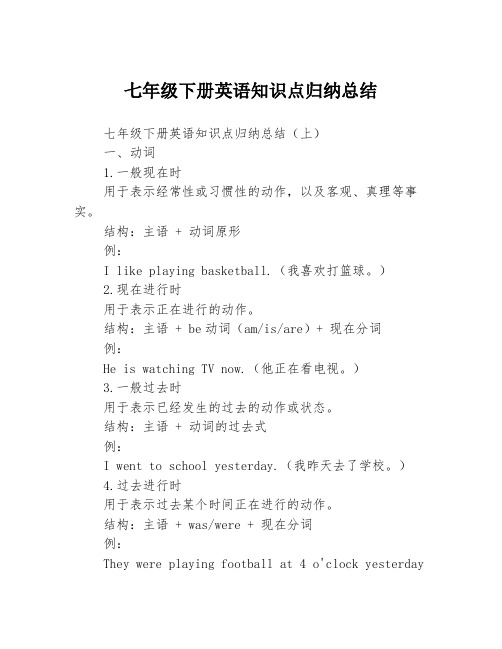
七年级下册英语知识点归纳总结七年级下册英语知识点归纳总结(上)一、动词1.一般现在时用于表示经常性或习惯性的动作,以及客观、真理等事实。
结构:主语 + 动词原形例:I like playing basketball.(我喜欢打篮球。
)2.现在进行时用于表示正在进行的动作。
结构:主语 + be动词(am/is/are)+ 现在分词例:He is watching TV now.(他正在看电视。
)3.一般过去时用于表示已经发生的过去的动作或状态。
结构:主语 + 动词的过去式例:I went to school yesterday.(我昨天去了学校。
)4.过去进行时用于表示过去某个时间正在进行的动作。
结构:主语 + was/were + 现在分词例:They were playing football at 4 o'clock yesterdayafternoon.(他们昨天下午4点正在踢足球。
)5.将来时用于表示将来某个时间要发生的事情。
结构:主语 + will/shall + 动词原形例:We will have a picnic next Saturday.(我们下周六去野餐。
)二、数词1.基数词表示数量的数字,如:one(1)、two(2)、three(3)等。
2.序数词表示顺序的数字,如:first(第一)、second(第二)、third(第三)等。
3.小数表示不是整数的数。
如:0.5、1.25等。
4.百分数表示百分比的数,如:50%、80%等。
三、名词1.可数名词表示能够用数目进行计算的名词,如:book(书)、student(学生)等。
2.不可数名词表示无法用数目进行计算的名词,如:water(水)、milk(牛奶)等。
3.复数名词表示“多个”的名词。
规则:在词尾加-s。
如:books(书)、students(学生)等。
四、形容词用于修饰名词或代词。
1.形容词的比较级用于表示两者之间的比较。
七年级英语下册单元知识点总结
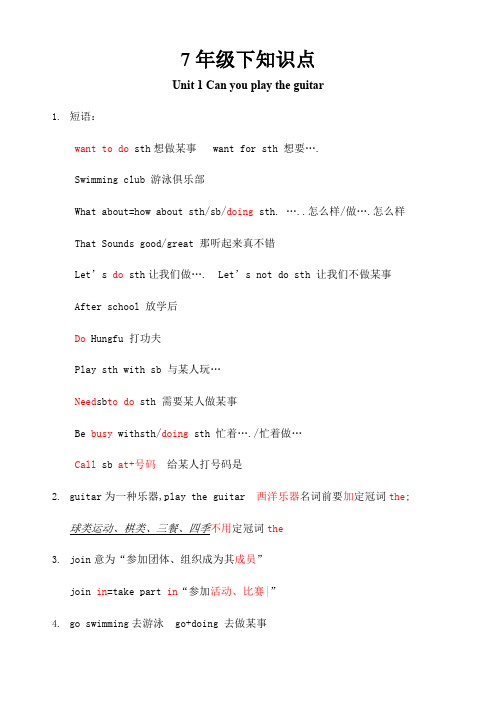
7年级下知识点Unit 1 Can you play the guitar1.短语:want to do sth想做某事 want for sth 想要….Swimming club 游泳俱乐部What about=how about sth/sb/doing sth. …..怎么样/做….怎么样 That Sounds good/great 那听起来真不错Let’s do sth让我们做…. Let’s not do sth 让我们不做某事After school 放学后Do Hungfu 打功夫Play sth with sb 与某人玩…Need sb to do sth 需要某人做某事Be busy withsth/doing sth 忙着…./忙着做…Call sb at+号码给某人打号码是2.guitar为一种乐器,play the guitar 西洋乐器名词前要加定冠词the;球类运动、棋类、三餐、四季不用定冠词the3.join意为“参加团体、组织成为其成员”join in=take part in“参加活动、比赛|”4.go swimming去游泳go+doing 去做某事5.注意区分:speak, say, talk和tella)①say说话 What can you sayb)②speak+语言c)③talk表示两个人或多个人在一起讲话、谈论多指随意谈论talk with sb与某人交谈 talk to sb 向某人说… talk about谈论…;d)④tell的意思是“告诉,讲述,吩咐”,讲故事或讲笑话多用tell;6.Show “表演,演出,出示……给某人看”, show sth. to sb.=show sb. sth.;7.show作名词,意为“展览,展出”on show “在展出” car show 车展;school show 学校公演fashion show 时装表演;a flower show花展8.help sth. 在……方面帮助某人help sth.帮助某人….. help sth.帮助某人干什么;a)I often help him do his homework.b)I often help him his homework.9.be good with... 与……相处得好;与……合得来=get on well withbe good at doing sth擅长做某事 be good for对……有益处;be good to sb 对某人好10.Can you play the guitar你能弹吉他吗情态动词:不能单独做谓语动词;无人称、单复数变化;后接动词原形1.表示能力能;会;如:He can speak English.他会说英语;2.表示许可,意为“可以”,这时可以和may通用,但是比may较正式;如:Can I use your pen我可以用你的钢笔吗3.表示可能性,意为“可能”,这时常出现在否定句中;如:It can’t be true.这不可能是真的;4.表示提供帮助;如:Can you help me你可以帮助我吗1.肯定句:主语+can+动词原形+其他;如:2.否定句:主语+can’t+动词原形+其他;如:3.一般疑问句:Can+主语+动词原形+其他肯定答语:Yes,主语+can.否定答语:No,主语+can’t.如:4.特殊疑问句:疑问词+can+主语+动词原形+其他如:What can I do for you我能为你做点什么呢Unit 2 What time do you go to school1.重点短语:get up 起床 get dressed 穿衣服 get on上车 get off 下车get home到达家中get to work到达工作岗位practice guitar 练吉它 practice doing sth练习做…leave home 离家take a shower = have a shower 洗淋浴澡have/eat breakfast/dinner/lunch 吃早、晚、午饭go to bed 睡觉反义词get upput on 穿衣服反义词take offdo one’s homework 做家庭作业tell sb. about sth. 告诉某人某事love to do = like to do 喜欢干某事 like doing sth at around/about six o’clock 六点左右in the morning/afternoon/evening 在早上/下午/晚上listen to 听…on weekends=at the weekend 在周末on school days 在学校上课日late for… …. 迟到了lots of =a lot of 许多a good /bad habit 好习惯take a walk=have a walk 散步live a happy life 过着幸福的生活2英语时间的表达What is the time 几点了It’s….1直接法:6:10 →six-ten 8:50→eight-fifty6:00 →six o’clocko’clock可省2借助介词to/past分钟数+to/past+小时小于等于30分钟“past” 超过10:15→ a quarter past ten或fifteen past ten 9:30→half past nine或thirty past nine大于30分钟“to”差….到….翻译时要注意时钟要加111:50→ten to twelve9:45→a quarter to ten或fifteen to ten3 what time与when的区别what time “几点”问的是具体的时间,回答要具体到小时;What time do you go to school你什么时候/几点上学when提问,回答既可以是具体的时间,也可以是不具体的时间,如:in the morning,last year,in 1998等范围大的时间;例如:When does he take a shower他什么时候洗澡He takes a shower in the morning.他在早上洗澡;也可用具体时间:I take a shower at 6 o’clock in the morning.我早上六点洗澡;3、 listen to, hear和sound△listen to意为“注意听”,表示有意识地去听,但不一定听得见什么,强调听的动作;They are listening to the teacher. 他们在听老师说;△hear意为“听见”,强调听的结果;如:I’m sorry to hear that.听到那个消息我很难过;△sound意为“听起来,听上去”,可作系动词+形容词The music sounds sweet. 这音乐听起来悦耳;Unit 3 How do you get to school1、重点短语搭配take the subway 乘地铁every day 每天think of 认为 think about 考虑between…and….在…和…之间 next to在旁边come true 实现I think so 我也这样认为I don’t think so 我不这样认为It’s easy /difficult for sb to do sth 对某人而言做什么是很容易/困难的it is easy to get to school到达学校很容易on a ropeway 坐缆索cross the river 穿过河流one 11-year-old boy 一个11岁的男孩红色部分为一个形容词I’m 11years old 我11岁quickly 动作上快 fast 速度上快 soon时间上快the river runs quickly 河水流的快ten minutes’ walk / a ten-minute walk =10 minutes on foot 10分钟的路be afraid to do/ be afraid of sth / doing害怕做某事why not +v原形 == why don’t you +v原形为什么不...........how to do it 怎么来做它what to do 做什么what do you think of =how do you like你觉得怎么样how long does it take sb to do sth花费某人多长时间做某事crossing the river is… 穿过河是…ing型动词做主语谓语动词用单数2、How do you get to school你怎样到达学校交通方式的表达:1 take/ride/drive + a/the +交通工具take a bus/car…2by +交通工具 by bus/car3on/in + a/the +交通工具in:封闭/半封闭/小型工具;on:大型4ride/fly/drive to +交通工具= go to +地点+by+交通工具walk to+地点= go to+地点on foot.eg: I drive to school every day.= I go to school by carI walk to school every day.= I go to school on foot3、spend, cost, pay 与 take区别(1)spendsb spend…on sth或spend…in doing sth.意为“某人花时间/金钱做某事”;eg: I spent 5 dollars on the book.=I spend 5 dollars buying the book.(2)coststh cost sb some money意为“某物花费某人多少钱”;eg: The skirt costs her 200 yuan.(3)paysb pay money for sth.意为“某人为某物付款”;eg: He paid 1000 yuan for the TV set.(4)takeIt takes sb time/ money to do sth.eg: It took him seven days to make the big cake.4、Then the early bus takes him to school.take…to…意为“把…带去…” bring….to….把…带来….5、how far用来提问距离,意为“多远;How far is it from A to B=How far is B from A A 到B有多远①用长度单位表示eg: —— How far is it from your home to the bus stop ——It’s five kilometers.②用时间表示eg: —— How far is the park from the shop——It’s ten minutes’ walk.6、how long 用来提问时间,意为“多久”;eg: —— How long have you been in America—— For two years. for+短时间表示“长达…”7、say, speak, talk与tell8、look, read, see与watch9、there be 句型就近原则There is no bridge=there is not a bride 这儿没有桥◆unit 4 Don’t eat in class.1、重点短语与句型on time准时 in time 及时fight for 为….而斗 fight against 为反对….而战斗 fight with 与…一起战斗go outsider 去外面It’s important for sb to do sth 对…人而言做…是很重要的practice sth/ doing sth 练习…/练习做…do the dishes 清洗餐具make bed 铺床be strict with sb 对某人严格remember/forget to do sth 记得/忘记要做…remember/forget doing sth 记得/忘记做过…follow the rules 遵守规则learn from sb/sth 从…..学习 learn to do sth 学会做某事be late for school 上学迟到have to 不得不don’t have to=needn’t 不必 must 的一般疑问句否定回答school uniform 校服on school nighs 在上学日的晚上too much+不可数名词“太多” too many +可数名词的复数“太多”much too + 形容词/副词“太….”in the kitchen 在厨房let/make/have sb do sth 让某人做某事good luck 好运keep+形容词保持… keep quiet 保持安静=be quietkeepsb doing sth 一直做某事 He keeps me waiting for him a long time. 他让我等了他很久keep sb from doing sth 阻止某人做某事have fun doing sth 很高兴做某事。
初一下册英语知识点总结归纳

初一下册英语知识点总结归纳第一章 Hello! (你好!)1. 问候语:Hello! Hi! Good morning/afternoon/evening! How are you? I'm fine, thank you. And you?2. 家庭成员表达:father, mother, sister, brother, grandfather, grandmother等。
3. 介绍自己:My name is... I am... years old. I am a student. I come from...第二章 Classroom language (教室用语)1. 基本课堂用语:sit down, stand up, open your book, close your book, listen, repeat, read, write等。
2. 数字表达:1-20。
3. 询问问题:What's this/that? What color is it? Is it...? Are they...?第三章 My schoolbag (我的书包)1. 物品名称:book, pen, pencil, ruler, eraser, bag, pencil case等。
2. 形容词:big, small, long, short, tall等。
3. 数量词:one, two, three等。
4. 句型:This is my... These are my...第四章 My classroom (我的教室)1. 教室物品:desk, chair, blackboard, whiteboard, map等。
2. 位置词:in, on, under, behind等。
第五章 My body (我的身体)1. 身体部位:head, eyes, ears, nose, mouth, hand, arm, leg, foot等。
七年级下册英语知识点总结归纳人教版
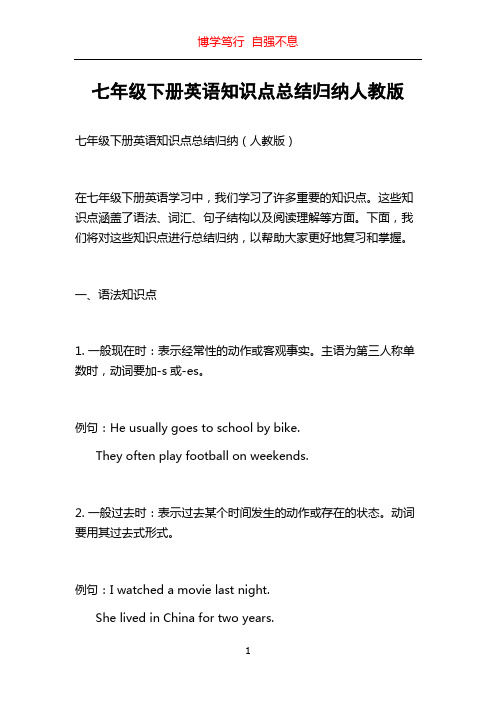
七年级下册英语知识点总结归纳人教版七年级下册英语知识点总结归纳(人教版)在七年级下册英语学习中,我们学习了许多重要的知识点。
这些知识点涵盖了语法、词汇、句子结构以及阅读理解等方面。
下面,我们将对这些知识点进行总结归纳,以帮助大家更好地复习和掌握。
一、语法知识点1. 一般现在时:表示经常性的动作或客观事实。
主语为第三人称单数时,动词要加-s或-es。
例句:He usually goes to school by bike.They often play football on weekends.2. 一般过去时:表示过去某个时间发生的动作或存在的状态。
动词要用其过去式形式。
例句:I watched a movie last night.She lived in China for two years.3. 现在进行时:表示说话时正在进行的动作。
构成:主语+be动词(am, is, are)+动词-ing。
例句:They are playing basketball in the park.We are learning English now.4. 一般将来时:表示将来要发生的动作或存在的状态。
构成:主语+will+动词原形。
例句:I will visit my grandparents next weekend.She will be a doctor in the future.5. 情态动词:can, may, must等,表示能力、许可、必须等。
例句:You can go to the park with us.Students must wear school uniforms.6. 宾语从句:用来充当主句中动词的宾语的从句。
例句:I think that he is a good student.She knows where the nearest supermarket is.二、词汇知识点1. 动词短语:由动词与副词/介词组成的短语。
七年级下册英语知识点归纳总结

七年级下册英语知识点归纳总结一、词汇与短语1. 学校科目:Math, Science, History, Geography, English, Chinese, Art, Music, PE (Physical Education)2. 学校设施:Library, Canteen, Gym, Playground, Computer lab, Auditorium3. 常见动词:Play, Sing, Dance, Draw, Read, Write, Listen, Speak, Think4. 常见形容词:Big, Small, Happy, Sad, Tall, Short, Young, Old, Beautiful, Ugly5. 日常活动:Get up, Brush teeth, Take a shower, Eat breakfast, Go to school, Have classes, Do homework, Watch TV, Go to bed6. 常见名词:Book, Pen, Pencil, Eraser, Notebook, Teacher, Student, Parent, Friend7. 常见介词:In, On, Under, Behind, Between, Next to, Across from, Above, Below8. 常见副词:Quickly, Slowly, Carefully, Loudly, Quietly, Well, Badly, Often, Never二、语法要点1. 时态- 一般现在时:表示经常发生的动作或状态,如:I usually play soccer on weekends.- 一般过去时:表示过去某一时间发生的动作或状态,如:He visited his grandparents last weekend.- 一般将来时:表示将来某一时间将要发生的动作,如:Theywill go on a trip next month.2. 代词- 人称代词主格:I, You, He, She, It, We, They- 物主代词:My, Your, His, Her, Its, Our, Their- 反身代词:Myself, Yourself, Himself, Herself, Itself, Ourselves, Themselves3. 冠词- 不定冠词:A, An (用于单数可数名词前)- 定冠词:The (用于特指的人或物前)4. 介词短语- 表示时间:At + 时间点 (at 8:00), On + 具体日期 (on Monday)- 表示地点:In + 大地方 (in the library), At + 小地方 (at the bus stop)5. 简单句和并列句- 简单句:只有一个主谓结构的句子,如:The dog barks.- 并列句:用并列连词连接的两个或多个简单句,如:She is smart and she works hard.6. 情态动词- Can, Could: 表示能力或许可,如:Can you help me? Could you open the window?- May, Might: 表示可能性,如:It might rain later.- Must, Have to: 表示必须,如:You must do your homework. We have to go now.三、阅读理解技巧1. 快速浏览(Skimming):快速阅读文章,抓住主旨大意。
七年级下册英语全部语法知识点
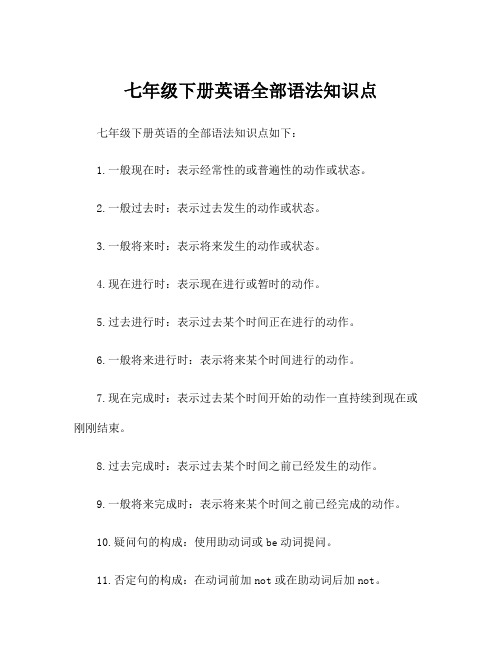
七年级下册英语全部语法知识点七年级下册英语的全部语法知识点如下:1.一般现在时:表示经常性的或普遍性的动作或状态。
2.一般过去时:表示过去发生的动作或状态。
3.一般将来时:表示将来发生的动作或状态。
4.现在进行时:表示现在进行或暂时的动作。
5.过去进行时:表示过去某个时间正在进行的动作。
6.一般将来进行时:表示将来某个时间进行的动作。
7.现在完成时:表示过去某个时间开始的动作一直持续到现在或刚刚结束。
8.过去完成时:表示过去某个时间之前已经发生的动作。
9.一般将来完成时:表示将来某个时间之前已经完成的动作。
10.疑问句的构成:使用助动词或be动词提问。
11.否定句的构成:在动词前加not或在助动词后加not。
12.肯定句的构成:直接陈述句子的内容。
13.比较级和最高级:用于比较两个或更多事物的形容词和副词。
14.表示数量的词汇:例如:all, most, some, any, few, a few, many, much等。
15.可数名词和不可数名词的用法。
16.单复数形式的变化规则。
17.形容词的用法和位置:用于修饰名词的词汇。
18.物主代词的用法:例如:mine, yours, his, hers, ours, theirs等。
19.反身代词的用法:例如:myself, yourself, himself, herself, ourselves, themselves等。
20.动词不定式的用法:用于表示目的、意图、结果等。
21.情态动词的用法:例如:can, could, may, might, must等。
22.介词的用法:表示位置、时间、原因、目的等。
23.祈使句的用法:用于发出命令、请求等。
24.从句的引导词和用法:例如:because, if, when, where, who等。
25.定语从句和状语从句的用法。
26.非谓语动词的用法:包括动词不定式、动名词和现在分词。
以上就是七年级下册英语的全部语法知识点。
七年级英语下册知识点总结

• 三. A ______ baby can only cry.
•
A. two month B. two months C. two-month-old D.two months old
• 四.Our school is
[在...对面]my house.
• Look, There is _______ over there. Do you know him?
•
My uncle will leave for the USA.
•
三.离开A地去B地: leave +A + for +B
•
My uncle will leave China for the USA.
• 九、stop 作名词时为“站” bus top
•
作动词时为“停止”,句型为:stop doing sth.停止正在做的事
• He is afraid of dogs.
• He is afraid of crossing the river. • [二]be afraid to do sth. 害怕做某事 He is afraid to go out at night.
• 七、He is like a father to me.
◆句型结构梳理
• 一、距离的表达法 • “A+be+距离+from+B”表示A地离B地有多远 • My home is about 一0 kilometers from school. • “be far away from” 表示离......多远,但是有具体的距离时则不要用far. • My home isn’t far away from the school. • His home is five kilometers away from the school.
七年级下学期英语各章节重要内容归纳

七年级下学期英语各章节重要内容归纳第一章:学校生活- 学科和教室- 学校设施和设备- 学校规则和制度- 课程时间表和课堂活动第二章:我的家庭- 家庭成员和亲戚关系- 家庭成员的职业和兴趣爱好- 家庭规则和家庭活动- 家庭成员之间的相处方式第三章:我的城市- 城市名称和地理位置- 城市景点和旅游景点- 城市交通和交通方式- 城市的文化和传统第四章:我的课余活动- 研究和爱好- 校外活动和俱乐部- 社交媒体和娱乐活动- 个人兴趣和追求第五章:购物和服装- 商店和市场- 购物的常用英语表达- 服装和时尚趋势- 参观商店和挑选服装第六章:健康和运动- 健康惯和饮食- 锻炼和运动方式- 平衡研究和休息- 保持健康的重要性第七章:节日和庆祝活动- 重要节日和传统俗- 节日庆祝活动和食物- 节日的意义和重要性- 节日庆祝的方式和惯第八章:环境保护- 环境问题和污染- 环境保护的重要性- 减少污染的方法和措施- 环境友好的生活方式第九章:世界各地的人们- 不同国家和地区的人们- 语言和文化差异- 人们的生活方式和传统- 尊重和理解不同文化背景的重要性第十章:未来的计划和梦想- 个人目标和职业梦想- 未来计划和学业规划- 实现梦想的方法和步骤- 努力和坚持的重要性以上是七年级下学期英语各章节的重要内容归纳。
每个章节都涉及不同主题,帮助学生了解和掌握相关的词汇和表达。
学生可以通过学习这些内容来提高英语水平和跨文化交流能力。
七年级下册英语知识点归纳总结

七年级下册英语知识点归纳总结七年级下册英语知识归纳1【重点短语】1. lost and found box 失物招领箱2. wele back 欢迎回来3. first of all 首先4. here is/are... 这有...5. from now on 从现在开始6. be careful with 小心保管7. whose bag 谁的包8. talk to sb. 与某人交谈9. mobile phone 移动电话,手机10. get on 上车 ( get off 下车)11. two thousand 两千 (thousands of 数以千计的...)12. look for 寻找13. at the moment 现在14. in a hurry 匆忙地15. alot of 许多,大量16. hundreds of 数以百计的17. on the train 在火车上18. every day 每天19. such as 例如20. make a list of 列一张...的清单21. ask/answer questions 问/回答问题【重点句型】1. Wele back to school! 欢迎回到学校!2. Whose bag is this? 这是谁的书包?3. It’s mine. 它是我的。
4. Are these crayons yours? 这些是你的蜡笔吗?5. Whose tapes are these? 这些是谁的磁带?6. Here’s a purple wallet! 这儿有个紫色钱包。
7. I think it’s Betty’s. 我认为它是贝蒂的。
8. Everyone, please be careful with your things from now on. 请大家从今以后仔细对待你们的东西。
9. People often lose things when they’re travelling or when they’re in a hurry. 当人们旅行或在匆忙中时,他们经常丢东西。
七下英语全书全部语法知识点总结

七下英语全书全部语法知识点总结Unit 1 Can you play the guitar?1. 情态动词+V原 can do= be able to do2. Play+ the+ 乐器+球类,棋类3. join 参加社团、组织、团体4. 4个说的区别:say+内容Speak+语言Talk 谈论 talk about sth talk with sb talk to sbTell 告诉,讲述 tell sb (not)to do sthTell stories/ jokes5. want= would like +(sb)to do sth6. 4个也的区别:too 肯定句末(前面加逗号)Either否定句末(前面加逗号)Also 行前be 后As well 口语中(前面不加逗号)7. be good at+ V-ing=do well in 擅长于be good for 对…有益(be bad for对…有害)be good to 对…友好(good 可用friendly,nice,kind替换)be good with和…相处好=get>8. 特殊疑问句的构成:疑问词+一般疑问句9. How/ what about+V-ing …怎么样?(表建议)10. 感官动词(look, sound, taste, smell, feel)+adj/ like11. 选择疑问句:回答不能直接用Yes或者No,要从中选择一个回答12. students wanted for school show(wanted表示招募,含有被动意义)13. show sth to sb=show sb sthgive sth to sb=give sb sth14. help sb (to)do sthHelp sb with sthWith sb’s help= with the help of sbHelp>15. be busy doing sth/ be busy with sth16. need to do sth17. be free= have time18. have friends= make friends19. call sb at +电话号码20.on the weekend= on weekends21. English-speaking students 说英语的学生(带有连词符,有形容词性质)22. do kung fu表演功夫Unit 2 What time do you go to school?1. 问时间用what time或者whenAt+钟点 at 7 o’clockat noon/ at night(during/ in the day)On+ 具体某天、星期、特指的一天on April 1st on Sunday on a cold winter morningIn +年、月、上午、下午、晚上2. 时间读法:顺读法逆读法:分钟≤30用pastfive past eight(8:05) half past eight(8:30)分钟>30用to a quarter to ten(9:45)整点用…o’clock 7 o’clock(7:00)3. 3个穿的区别:wear 表状态,接服装、手套、眼镜、香水等Put>Dress 表动作,接sb/>4. from…to…5. be/ arrive late for6. 频度副词(行前be后)Always usually often sometimesseldom hardly never7. 一段时间前面要用介词forfor half an hour for five minutes8. eat/ have… for breakfast/ lunch/ dinner/ supper9. either…or10. a lot of=lots of11. it is +adj+for sb +to do sth (adj修饰to do sth)It is important for me to learn English.it is +adj+of sb +to do sth (adj修饰sb)It is kind/ friendly/ nice of you to help me.12. 感叹句:How+adj+主谓!How+adj+a/an +n单+主谓!What+ a/an +adj+ n单+主谓!What+ adj+ n复/ 不可数+主谓!Unit 3 How do you get to school?1. 疑问词How 如何(方式)how long 多长(时间)答语常用“(For/ about +)时间段”how far多远(距离)答语常用“(It’s +)数词 +miles/ meters/ kilometers”how often多久一次(频率)答语常用“Always/ often/ every day/…”或“次数+时间”等表频率的状语How soon多快,多久以后,常用在将来时中。
七年级下册英语知识点大全
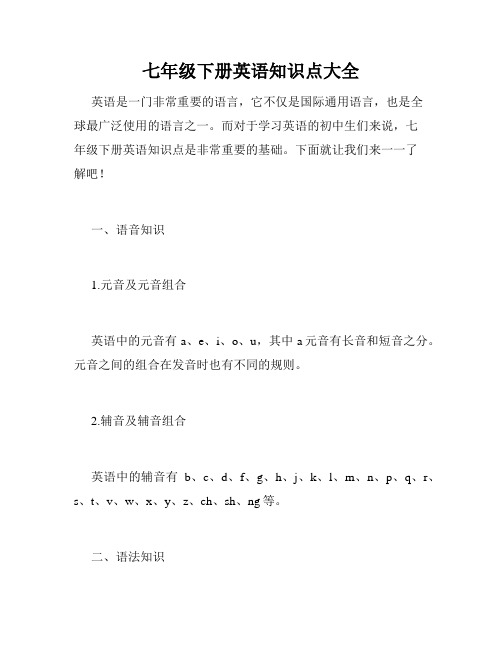
七年级下册英语知识点大全英语是一门非常重要的语言,它不仅是国际通用语言,也是全球最广泛使用的语言之一。
而对于学习英语的初中生们来说,七年级下册英语知识点是非常重要的基础。
下面就让我们来一一了解吧!一、语音知识1.元音及元音组合英语中的元音有a、e、i、o、u,其中a元音有长音和短音之分。
元音之间的组合在发音时也有不同的规则。
2.辅音及辅音组合英语中的辅音有b、c、d、f、g、h、j、k、l、m、n、p、q、r、s、t、v、w、x、y、z、ch、sh、ng等。
二、语法知识1.to be动词的变化be动词在不同的人称、单复数及时态下都有不同的变化。
如:I am, he is, we are等。
2.一般现在时表示现在正在进行的动作或状态,如:I go to school every day.3.一般过去时表示过去已经完成的动作或状态,如:I went to the park yesterday.4.现在进行时表示现在正在进行的动作或状态,并强调正在进行,如:I am reading a book now.5.将来时表示将要发生的动作或状态,如:I will go to the cinema tomorrow.6.形容词和副词的区别形容词用来修饰名词,描述人或物的特征;副词用来修饰动词、形容词或其他副词,描述动作或状态。
7.简单句和复合句简单句由主语和谓语组成;复合句由主句和从句组成。
三、词汇知识1.常用动词be、do、have、go、come、eat、see、get、make、like、want 等。
2.常用名词book、teacher、student、school、classroom、desk、bag、pen、homework、test等。
3.常用形容词和副词good、bad、happy、sad、big、small、fast、slow、hard、easy 等。
4.常用介词和连词in、on、at、with、for、to、and、but、or等。
初一下册英语知识点总结归纳

初一下册英语知识点总结归纳一、词汇1. 常用单词:如人称代词、颜色、数字、时间、家庭成员等。
2. 动词:如be动词、情态动词、实义动词等。
3. 形容词和副词:如描述人物特征、事物性质等的形容词,以及表示程度、方式等的副词。
4. 介词和连词:如表示位置、时间、原因等的介词,以及连接句子、词语等的连词。
5. 短语和固定搭配:如常用的动词短语、形容词短语、副词短语等。
二、语法1. 时态:如一般现在时、一般过去时、一般将来时等。
2. 语态:如主动语态和被动语态。
3. 句型:如陈述句、疑问句、祈使句、感叹句等。
4. 从句:如宾语从句、定语从句、状语从句等。
5. 主谓一致:如主语和谓语在人称和数上要保持一致。
6. 直接引语和间接引语:如将直接引语转化为间接引语的规则。
7. 比较级和最高级:如形容词和副词的比较级和最高级的构成和用法。
8. 不定代词:如some, any, no, every等不定代词的用法。
9. 冠词:如a, an, the的用法。
10. 名词性从句:如主语从句、宾语从句、表语从句等的用法。
三、阅读理解1. 阅读技巧:如快速浏览文章,找出关键词,理解文章大意等。
2. 阅读题型:如选择题、填空题、判断题等。
3. 阅读材料:如故事、新闻报道、广告等不同类型的阅读材料。
四、写作1. 书写规范:如字母大小写、标点符号的使用等。
2. 句子结构:如简单句、并列句、复合句等的构成和用法。
3. 段落结构:如开头段、主体段、结尾段的写作方法。
4. 作文类型:如记叙文、说明文、议论文等不同类型的作文写作。
五、听力和口语1. 听力技巧:如预测答案、注意关键词等。
2. 听力题型:如听对话选择正确答案、听短文回答问题等。
3. 口语表达:如问候、介绍自己、询问信息等常用口语表达。
4. 口语练习:如角色扮演、对话练习等口语训练方法。
六、文化知识1. 英语国家的文化习俗:如节日庆祝活动、饮食习惯等。
2. 英语国家的地理知识:如国家名称、地理位置等。
- 1、下载文档前请自行甄别文档内容的完整性,平台不提供额外的编辑、内容补充、找答案等附加服务。
- 2、"仅部分预览"的文档,不可在线预览部分如存在完整性等问题,可反馈申请退款(可完整预览的文档不适用该条件!)。
- 3、如文档侵犯您的权益,请联系客服反馈,我们会尽快为您处理(人工客服工作时间:9:00-18:30)。
初一英语下册知识点归纳总结【知识梳理】27. in the middle of the dayI. 重点短语28. in the morning / afternoon/ evening1. a bottle of29. on a farm2. a little30. in a factory3. a lot (of)4. all day II.重要句型5. be from 1.Let sb. do sth.6. be over 2.Could sb. do sth.?7. come back 3. would like sth.8. come from 4. would like to do sth.9. do one ’ s homework 5.What about something to eat?10. do the shopping 6.How do you spell⋯?11. get down7.May I borrow⋯?12. get home13. get to III.交际用语14. get up 1. — Thanks very much!15. go shopping—You're welcome.16. have a drink of 2.Put it/them away.17. have a look 3.What's wrong?18. have breakfast 4.I think so.I don't think so.19. have lunch 5.I want to take some books to the20. have supper classroom.21. listen to 6.Give me a bottle of orange juice,22. not⋯ at all please.23. put⋯ away Please give it /them back tomorrow.24. take off OK.25. throw it like that9.What's your favourite sport?26. would like10. Don't worry.11.I ’ m (not) good at basketball.12.Do you want a go?13.That's right./ That ‘alls right./ All right.15.We / They have some CDs.We / They don ’ t have any CDs. 16.---What day is it today / tomorrow? --- It ’ s Monday.17.---May I borrow your colour pens, please?---Certainly. Here you are.18.---Where are you from?---From Beijing.19.What's your telephone number in New York?20.---Do you like hot dogs?IV.重要语法1.人称代词的用法;2.祈使句;3.现在进行时的构成和用法;4.动词 have 的用法;14.Do you have a dictionary / any dictionaries?Yes, I do. / No, I don’ t.---Yes, I do. ( A little. / A lot. / Very much.)---No, I don't. ( I don't like them at all.)21. ---What does your mother like?---She likes dumplings and vegetables very much.22.---When do you go to school every day?---I go to school at 7:00 every day. 23.---What time does he go to bed in the evening?---He goes to bed at 10:00.5.一般现在时构成和用法;6.可数名词和不可数名词的构成和用法【名师讲解】1. That's right./ That‘s all right./ All right.That ’s right意为“对的”,表示赞同对方的意见、看法或行为,肯定对方的答案或判断。
例如: "I think we must help the old man.""我想我们应该帮助这位老人。
""That's right."或"You're right.""说得对"。
That ’s all right.意为“不用谢”、“没关系”,用来回答对方的致谢或道歉。
例如:"Many thanks." "That's all right." "Sorry.It's broken." "That's allright."All right.意为“行了”、“可以”,表示同意对方的建议或要求。
有时还可以表示“身体很好”"Please tell me about it." "请把此事告诉我。
" "All right.""好吧。
"Is your mother all right?你妈身体好吗2. make/do这两个词都可以解释为“做” ,但含义却不同,不能混用。
make指做东西或制东西, do 指做一件具体的事。
Can you make a paper boat for me?你能为我做个纸船吗?He’s doing his homework now.他正在做他的作业。
3. say/speak/talk/tellsay:是最口语化的最普通的一个词,意为“说出”、“说道”,着重所说的话。
如:“ I want to go there by bus” , he said .他说,“我要坐汽车到那里去。
”Please say it in English .请用英语说。
speak : “说话”,着重开口发声,不着重所说的内容,一般用作不及物动词 ( 即后面不能直接接宾语 ) 。
如: Can you speak about him? 你能不能说说他的情况? I don ’ t like to speak like this.我不喜欢这样说话。
speak 作及物动词解时,只能和某种语言等连用,表达在对话中恰当使用词汇的能力。
如: She speaks English well.她英语说得好。
talk :与speak意义相近,也着重说话的动作,而不着重所说的话,因此,一般也只用作不及物动词,不过,talk暗示话是对某人说的,有较强的对话意味,着重指连续地和别人谈话。
如:I would like to talk to him about it .我想跟他谈那件事。
Old women like to talk with children.老年妇女喜欢和孩子们交谈。
tell :“告诉” ,除较少情况外,一般后面总接双宾语。
如:He’s telling mea story.他在给我讲故事。
tell a lie撒谎 tell sb.to do sth./tell sb. not to do sth如:.Miss Zhao often tells us to study hard.4. do cooking/ do the cookingdo cooking 作“做饭”解,属泛指。
do the cooking特指某一顿饭或某一家人的饭。
cooking 为动名词,不能用作复数,但前面可用some, much修饰。
从 do some cooking可引出许多类似的短语:do some washing洗些衣服 do some shopping买些东西 do some reading读书 do some writing写些东西 do some fishing钓鱼从以上短语可引申出另一类短语,不能用some, much 或定冠词。
go shopping去买东西 go fishing去钓鱼 go boating去划船 go swimming 去游泳5. like doing sth./ like to do sth.like doing sth.与 like to do sth.意思相同,但用法有区别。
前者强调一般性的爱好或者表示动作的习惯性和经常性;后来表示一次性和偶然性的动作。
例如:He likes playing football,but he doesn ‘t like to play football with Li Ming. 他喜欢踢足球,但是他不喜欢和李明踢。
6. other/ others/ the other/ anotherother表其余的,别的,如:Have you any other questions?你还有其他问题吗?others 别的人,别的东西 . 如: In the room some people are American, theothers are French. 在屋子里一些人是美国人 , 其他的是法国人。
the other 表另一个(二者之中) one⋯,the other ⋯如: Oneof mytwo brothers studies English, the other studies Chinese.我两个哥哥中的一个学习英文,另一个学中文。
another 表三者以上的另一个,另一些如:There is room for another few books on the shelf.书架上还可以放点书。
7. in the tree/ on the treein the tree与on the tree.译成中文均为"在树上"但英语中有区别。
in thetree表示某人、某事(不属于树本身生长出的别的东西)落在树上,表示树的枝、叶、花、果等长在树上时,要使用on the tree. 如: There are someappleson the tree.那棵树上有些苹果。
